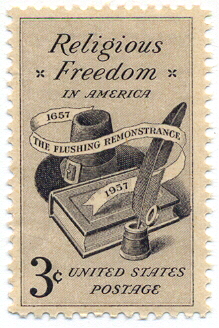Freedom of religion
Freedom of religion is a principle that supports the freedom of an individual or community, in public or private, to manifest religion or belief in teaching, practice, worship, and observance. It also includes the freedom to change one's religion or beliefs. Freedom of religion is considered by many people and most of the nations to be a fundamental human right. In a country with a state religion, freedom of religion is generally considered to mean that the government permits religious practices of other sects besides the state religion, and does not persecute believers in other faiths.
History[edit | edit source]
Freedom of religion is a modern legal concept that has developed in the context of a long history of religious persecution. The concept can be traced back to the Greek city-states, the Roman Empire, and other early civilizations, where certain degrees of religious tolerance were practiced. However, it was not until the Enlightenment in the 17th and 18th centuries that freedom of religion began to be formally recognized as a basic human right, culminating in its inclusion in various national constitutions and international documents, such as the United States Constitution, which includes the First Amendment, and the Universal Declaration of Human Rights (Article 18), adopted by the United Nations in 1948.
Legal Status[edit | edit source]
Around the world, freedom of religion is protected under various international laws and agreements. The International Covenant on Civil and Political Rights (ICCPR), which has been ratified by many countries, mandates that everyone shall have the right to freedom of thought, conscience, and religion. This includes the freedom to have or to adopt a religion or belief of one's choice, and the freedom, either individually or in community with others and in public or private, to manifest one's religion or belief in worship, observance, practice, and teaching.
Despite these protections, the reality is that many countries still impose significant restrictions on religious practices. These restrictions can range from limitations on the construction of places of worship to outright persecution of individuals for their religious beliefs.
Controversies and Challenges[edit | edit source]
The principle of freedom of religion is not without its controversies and challenges. One major issue is the conflict between freedom of religion and other rights, such as the rights of women and LGBT rights. For example, some religious practices may conflict with the principles of equality and non-discrimination. Balancing these rights is a complex and sensitive issue that requires careful consideration by lawmakers, courts, and societies.
Another challenge is the rise of religious extremism, which can lead to violence and terrorism. This has led some governments to enact laws that restrict religious practices in the name of national security. Critics argue that such laws often go too far and end up infringing on the very freedoms they are meant to protect.
See Also[edit | edit source]
Conclusion[edit | edit source]
Freedom of religion is a fundamental human right that is essential for a peaceful and harmonious society. It allows individuals to live according to their beliefs and promotes tolerance and understanding among different religious communities. However, achieving true freedom of religion requires constant vigilance and effort to protect this right from infringement, whether by governments, societal groups, or individuals.
Transform your life with W8MD's budget GLP1 injections from $125
W8MD offers a medical weight loss program NYC and a clinic to lose weight in Philadelphia. Our W8MD's physician supervised medical weight loss centers in NYC provides expert medical guidance, and offers telemedicine options for convenience.
Why choose W8MD?
- Comprehensive care with FDA-approved weight loss medications including:
- loss injections in NYC both generic and brand names:
- weight loss medications including Phentermine, Qsymia, Diethylpropion etc.
- Accept most insurances for visits or discounted self pay cost.
- Generic weight loss injections starting from just $125.00 for the starting dose
- In person weight loss NYC and telemedicine medical weight loss options in New York city available
- Budget GLP1 weight loss injections in NYC starting from $125.00 biweekly with insurance!
Book Your Appointment
Start your NYC weight loss journey today at our NYC medical weight loss, and Philadelphia medical weight loss Call (718)946-5500 for NY and 215 676 2334 for PA
Search WikiMD
Ad.Tired of being Overweight? Try W8MD's NYC physician weight loss.
Semaglutide (Ozempic / Wegovy and Tirzepatide (Mounjaro / Zepbound) available. Call 718 946 5500.
Advertise on WikiMD
|
WikiMD's Wellness Encyclopedia |
| Let Food Be Thy Medicine Medicine Thy Food - Hippocrates |
Translate this page: - East Asian
中文,
日本,
한국어,
South Asian
हिन्दी,
தமிழ்,
తెలుగు,
Urdu,
ಕನ್ನಡ,
Southeast Asian
Indonesian,
Vietnamese,
Thai,
မြန်မာဘာသာ,
বাংলা
European
español,
Deutsch,
français,
Greek,
português do Brasil,
polski,
română,
русский,
Nederlands,
norsk,
svenska,
suomi,
Italian
Middle Eastern & African
عربى,
Turkish,
Persian,
Hebrew,
Afrikaans,
isiZulu,
Kiswahili,
Other
Bulgarian,
Hungarian,
Czech,
Swedish,
മലയാളം,
मराठी,
ਪੰਜਾਬੀ,
ગુજરાતી,
Portuguese,
Ukrainian
Medical Disclaimer: WikiMD is not a substitute for professional medical advice. The information on WikiMD is provided as an information resource only, may be incorrect, outdated or misleading, and is not to be used or relied on for any diagnostic or treatment purposes. Please consult your health care provider before making any healthcare decisions or for guidance about a specific medical condition. WikiMD expressly disclaims responsibility, and shall have no liability, for any damages, loss, injury, or liability whatsoever suffered as a result of your reliance on the information contained in this site. By visiting this site you agree to the foregoing terms and conditions, which may from time to time be changed or supplemented by WikiMD. If you do not agree to the foregoing terms and conditions, you should not enter or use this site. See full disclaimer.
Credits:Most images are courtesy of Wikimedia commons, and templates, categories Wikipedia, licensed under CC BY SA or similar.
Contributors: Prab R. Tumpati, MD







